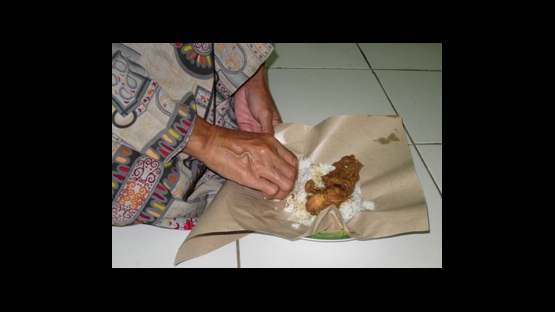Residents of the remote Indonesian village of Cikadu saw their lifestyle swept away by a large landslide that struck 1 February 2014. The slide, which followed two months of rains, damaged almost 900 homes and displaced more than 2000 villagers. Months later, almost 200 of those displaced remain sheltered at a camp by the Public Health Centre Building, with nowhere else to go.
In such trying times, food becomes particularly important, not only as a source of nourishment, but also as a source of solace. But the landslide disrupted energy and food supplies, making meals hard to come by. However, thanks to IAEA-sponsored work done by Ira Koenari, a food irradiation specialist at the National Nuclear Agency Jakarta, the displaced villagers have access to traditional Indonesian dishes.
The dishes are sealed in pouches and exposed to ionising radiation, which eliminates any microorganisms that could spoil the food, enabling it to be transported to the affected region and stored at room-temperature for a long time without going bad. The irradiation of the food leaves no residues and does not affect taste or texture. This makes the process suitable for the preparation of emergency rations of the kind eaten by the Cikadu landslide victims. The recipes for the rations were developed through an international research project coordinated by the IAEA through its partnership with FAO and financially supported by the IAEA, FAO and Indonesia's National Nuclear Energy Agency, BATAN.
"We have beef, fish and soya dishes available that are safe to eat and are well-received. Of course, everyone would prefer that they could cook themselves like in normal times, but considering the circumstances, they are glad to get familiar food they know will not make them sick," says Ms. Koenari.
The IAEA has worked on irradiated food since the early 1960's when scientists were beginning to explore the possibilities. In the 1970s, the U.S. space agency NASA introduced irradiated food on astronauts' menus, and the technology has continued to evolve over the years.
In 2010, the Joint FAO/IAEA Programme launched a multi-year international research project on irradiated food that, in addition to the Cikadu landslide victims, also benefits patients who could easily fall victim to food illness because their immune systems are compromised, for example by cancer treatments. The research project involves institutes and hospitals in 16 different countries across the world, including the National Nuclear Agency Jakarta.


